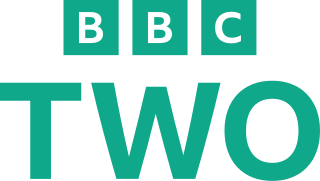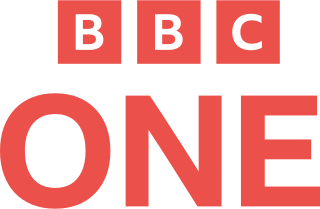
The BBC News channel is a British free-to-air public broadcast television news channel owned and operated by the BBC. The channel is based at and broadcasts from Broadcasting House in the West End of London from which it is anchored during British daytime, with overnight broadcasts anchored from Washington, D.C. and Singapore. It was launched as BBC News 24 on 9 November 1997 at 17:30, as part of the BBC's foray into digital domestic television channels, becoming the first competitor to Sky News, which had been running since 1989.
A television broadcaster or television network is a telecommunications network for the distribution of television content, where a central operation provides programming to many television stations, pay television providers or, in the United States, multichannel video programming distributors. Until the mid-1980s, broadcast programming on television in most countries of the world was dominated by a small number of terrestrial networks. Many early television networks such as the BBC, CBC, PBS, PTV, NBC or ABC in the US and in Australia evolved from earlier radio networks.

ITV, legally known as Channel 3, is a British free-to-air public broadcast television network. It is branded as ITV1 in most of the UK except for central and northern Scotland, where it is branded as STV. It was launched in 1955 as Independent Television to provide competition, eliminating what had been the monopoly of BBC Television. ITV is the oldest commercial network in the UK. Since the passing of the Broadcasting Act 1990, it has been legally known as Channel 3 to distinguish it from the other analogue channels at the time: BBC1, BBC2 and Channel 4.

The Waltons is an American historical drama television series about a family in rural mountainous Western Virginia of the Appalachian Mountains / Allegheny Mountains / Blue Ridge Mountains chain, during the economic hardships and mass unemployment of the era of the Great Depression of the 1930s and subsequent wartime homefront of World War II of the early 1940s. It was created by screenwriter / author Earl Hamner Jr. (1923–2016), based on his 1961 book / novel Spencer's Mountain and the following 1963 film of the same name. The Waltons television series aired almost a decade later from 1972 to 1981, however relocated from the Spencers family 1963 film portrayal of the geographic site in the Grand Teton Mountains of Wyoming and late 1950s era to creator Hammer's real-life memories / reminices and home turf of western Virginia (born and raised near Schuyler and appropriate time period of the Depression era '30s and wartime '40s of fictional village of Walton's Mountain, Jefferson County, near the town of Rockfish in Virginia.

Children's television series are television programs designed specifically for children. They are typically characterised by easy-going content devoid of sensitive or adult themes and are normally broadcast during the morning and afternoon when children are awake, immediately before and after school schedules generally start in the country where they air. Educational themes are also prevalent, as well as the transmission of cautionary tales and narratives that teach problem-solving methods in some fashion or another, such as social disputes.

BBC Two is a British free-to-air public broadcast television channel owned and operated by the BBC. It is the corporation's second flagship channel, and it covers a wide range of subject matter, incorporating genres such as comedy, drama and documentaries. BBC Two has a remit "to broadcast programmes of depth and substance" in contrast to the more mainstream and popular BBC One.
Television broadcasts in the United Kingdom began in 1932, however, regular broadcasts would only begin four years later. Television began as a public service which was free of advertising, which followed the first demonstration of a transmitted moving image in 1926. Currently, the United Kingdom has a collection of free-to-air, free-to-view and subscription services over a variety of distribution media, through which there are over 480 channels for consumers as well as on-demand content. There are six main channel owners who are responsible for most material viewed.

Creature Comforts is a British adult stop-motion comedy mockumentary franchise originating in a 1989 British humorous animated short film of the same name. The film matched animated zoo animals with a soundtrack of people talking about their homes, making it appear as if the animals were being interviewed about their living conditions. It was created by Nick Park and Aardman Animations. The film later became the basis of a series of television advertisements for the electricity boards in the United Kingdom. In 2003, a television series in the same style was released. An American version of the series was also made. A sequel series, Things We Love, first aired on BBC One in 2024.

BBC One is a British free-to-air public broadcast television channel owned and operated by the BBC. It is the corporation's oldest and flagship channel, and is known for broadcasting mainstream programming, which includes BBC News television bulletins, primetime drama and entertainment, and live BBC Sport events.
The Comic Strip are a group of British comedians who came to prominence in the 1980s. They are known for their television series The Comic Strip Presents..., which was labelled as a pioneering example of the alternative comedy scene. The core members are Adrian Edmondson, Dawn French, Rik Mayall, Nigel Planer, Peter Richardson and Jennifer Saunders, with appearances by Keith Allen, Robbie Coltrane, Alexei Sayle and others.

CBeebies is a British free-to-air public broadcast children's television channel owned and operated by the BBC. It is also the brand used for all BBC content targeted for children aged six years and under. Its sister channel, CBBC, is intended for older children aged six to twelve. It broadcasts every day from 6:00 am to 7:00 pm, timesharing with BBC Four.

Talkback Thames was a British television production company, a division of FremantleMedia, part of the RTL Group, which in turn is owned by Bertelsmann. It was formed by the merger of Talkback Productions and Thames Television. This merger was arranged in February 2003 and reversed in January 2012.

Teddington Studios was a large British television studio in Teddington, London Borough of Richmond upon Thames, providing studio facilities for programmes airing on the BBC, ITV, Channel 4, Channel 5, Sky1 and others. The complex also provided studio space for channel continuity. Towards the end of its history the site was run by the Pinewood Studios Group.
The history of BBC television idents begins in the early 1950s when the BBC first displayed a logo between programmes to identify its service. As new technology has become available, these devices have evolved from simple still black and white images to the sophisticated full colour short films seen today. With the arrival of digital services in the United Kingdom, and with them many more new channels, branding is perceived by broadcasters to be much more important, meaning that idents need to stand out from the competition.
Television in Scotland mostly consists of UK-wide broadcasts, with regional variations at different times which are specific to Scotland. The BBC and ITV networks both began broadcasting in the country during the 1950s. There were further expansions in the early 1960s with the arrival of Grampian, Border and BBC2 television.
A quiz channel is a television channel that focuses on phone-in quizzes. The quizzes usually focus on puzzles, such as filling in blanks, identifying subjects, or other forms of word puzzles. The channels make money by encouraging viewers to call a toll phone number for the chance to play.
British television science fiction refers to programmes in the genre that have been produced by both the BBC and Britain's largest commercial channel, ITV. BBC's Doctor Who is listed in the Guinness Book of World Records as the longest-running science fiction television show in the world, and has been called the "most successful" science fiction series of all time.
Gordon Murray was a British television producer and puppeteer. He created and wrote some of the most repeated children's television programmes ever seen in Britain. Camberwick Green, Trumpton, and Chigley, collectively known as the Trumptonshire Trilogy, were all produced by the company he founded.
The British Broadcasting Corporation (BBC) is a British public service broadcaster headquartered at Broadcasting House in London, England. Originally established in 1922 as the British Broadcasting Company, it evolved into its current state with its current name on New Year's Day 1927. The oldest and largest local and global broadcaster by stature and by number of employees, the BBC employs over 21,000 staff in total, of whom approximately 17,200 are in public-sector broadcasting.

A television show, TV program, or simply a TV show, is the general reference to any content produced for viewing on a television set that is traditionally broadcast via over-the-air, satellite, or cable. This generally excludes breaking news or advertisements that are aired between shows or between segments of a show. A regularly recurring show is called a television series, and an individual broadcast of such a series is called an episode. Epidodes are usually broadcast in annual sets, which are called seasons in North America and series in other regions. A one-off television show may be called a television special, while a short series of episodes is a miniseries. A television film, or telefilm, is a feature film created for broadcasting on television.










